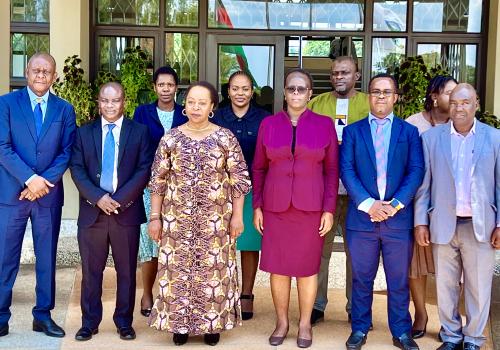These sentiments were expressed by Ms. Angele Makombo N'tumba, the Southern African Development Community (SADC) Deputy Executive Secretary Responsible for Regional Integration during her working visit to the Lilongwe University of Agriculture and Natural Resources (LUANAR) in Lilongwe, Malawi on 8th February 2024.
According to Ms. N'tumba, the SADC region is abundantly endowed with vast water bodies and rich aquatic resources, making it an optimal environment for the development of fisheries and aquaculture.
LUANAR serves as a strategic partner to the SADC Secretariat through its participation in the SADC Regional Training Programme on Transformation of Aquaculture, Fish Processing, and Value Addition (AquaTrans), which aims to facilitate knowledge and skills sharing among stakeholders in order to strengthen capacity in fish farming technologies, post-harvest processing, and commercialisation.
Moreover, the university plays a crucial role in promoting sustainable development in the region, particularly in enhancing the SADC's fisheries and aquaculture sector.
Ms N'tumba emphasised that the research outcomes from the university have greatly contributed to evidence-based decision-making in fisheries and aquaculture management, as well as the exchange of information and experiences, ultimately benefiting the entire SADC community.
She expressed her appreciation for LUANAR's management of the AquaTrans training course, with support from the New Partnership for Africa Development – Southern Africa Network for Biosciences (NEPAD-SANBio) BioFISA II Programme, a Finnish-Southern African Partnership Programme. She acknowledged the significant role AquaTrans has played in bolstering expertise in the region.
Dr. Agnes Mwangwela, the Deputy Vice Chancellor of LUANAR, highlighted Malawi's connection and role in the development of fisheries for the SADC region, notably, when SADC had decentralised functions and Malawi coordinated the inland fisheries and aquaculture.
She acknowledged the university’s contributions as a key stakeholder in aquaculture training and research, emphasising that these efforts have strengthened the foundation for sustainable aquaculture development and management through improved data collection and analysis. She emphasised that the institution, which is recognised as a center of excellence in aquaculture and fisheries science, highly values training programmes that support increased fish production to meet the needs of a rapidly growing population, not just for Malawi but the entire region.
She also added that the university strives to enhance fish value chains for both nutrition and the promotion of food security and economic development through job and wealth creation, poverty reduction, and increased regional trade.
The Deputy Executive Secretary further received presentations from various faculties on their curriculum including topics such as aquaculture, fisheries, fish health and diseases, and aquatic health.
Additionally, Ms. N’tumba was given a guided tour of the fishponds to gain insight into the processes involved in fish production, breeding, as well as the integrated aquaculture system at the university.

